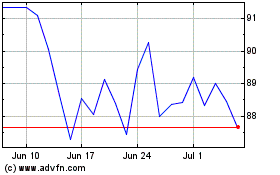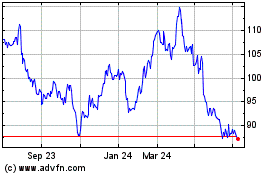Audi to Cut 9,500 Positions In Sluggish Auto Market -- WSJ
November 27 2019 - 3:02AM
Dow Jones News
By William Boston
This article is being republished as part of our daily
reproduction of WSJ.com articles that also appeared in the U.S.
print edition of The Wall Street Journal (November 27, 2019).
BERLIN -- Luxury-car maker Audi AG said it would eliminate 9,500
jobs over the next five years as part of a restructuring aimed at
bolstering profit in a slowing global auto market.
The overhaul is expected to reap savings of roughly EUR6 billion
($6.6 billion) through 2029, a large part intended to finance
Audi's move away from production of conventional cars and toward
electric vehicles. The plan doesn't entail any layoffs through
2029, with the workforce reduction to be achieved through employee
turnover.
Major auto makers are struggling with a slowdown in the global
economy and rising development costs to produce electric cars to
meet stricter guidelines on greenhouse-gas emissions.
Audi, which is based in Ingolstadt, Germany, is also losing
ground in the premium-car market as new competitors make a bid for
the profits to be had from selling high-priced luxury vehicles.
In the first nine months of this year, Audi's car production
fell 6% from a year earlier to 1.4 million vehicles as a result of
declining global demand. Sales fell to EUR41.3 billion from EUR44.3
billion, while after-tax profit rose to EUR2.8 billion from EUR2.5
billion.
Audi was long reluctant to go electric, and instead was
instrumental to developing illegal software that allowed its
parent, Volkswagen AG, to rig millions of diesel-powered cars to
cheat emissions testing for a decade. The deception was uncovered
by researchers, and in 2015 U.S. authorities charged Volkswagen and
Audi for committing fraud and violating U.S. environmental laws. In
2016, Volkswagen pleaded guilty and has faced fines, penalties,
compensation costs and legal fees of more than $30 billion.
The affair tainted Audi's image and it lost ground to its main
rivals, BMW AG and Daimler AG's Mercedes-Benz. Audi's former chief
executive, Rupert Stadler, was arrested and detained for months on
charges stemming from the diesel scandal.
Audi has been hit by the sluggish global economy, especially in
China, where the company was once the best-selling luxury brand
before losing market share to its German rivals, as well as U.S.
brands Cadillac and Lincoln.
"In times of upheaval, we are making Audi more agile and more
efficient. This will increase productivity and sustainably
strengthen the competitiveness of our German plants, " Bram Schot,
the company's interim CEO, said in a statement Tuesday.
Mr. Schot is set to be replaced in April by Markus Duesmann, who
was poached from BMW by Volkswagen CEO Herbert Diess, who also came
over from BMW.
Earlier this year, Audi launched its first all-electric vehicle,
a sporty SUV that is positioned to challenge the Tesla Model 3 and
the Mercedes EQC for dominance in the market for premium electric
sport utility vehicles.
Audi's restructuring plan comes on the heels of similar
announcements by BMW, Daimler and major automotive suppliers such
as Continental AG.
Struggling under the burden of the transition to electric in a
slowing global economy, German automotive companies have announced
tens of thousands of job cuts and a handful of plant closures in
Europe, China, and the U.S.
As it eliminates some jobs, Audi plans to create 2,000 new
positions in development and production of electric cars and
digitalization of its factories. The company, which had more than
91,600 employees in 2018, said it would give priority to retraining
existing staff to fill the spots, but also look make outside
hires.
The details of the restructuring plan were thrashed out in
months of negotiations with labor representatives. Under German
law, labor has half the seats on Audi's nonexecutive supervisory
board, forcing the company to offer incentives to gain approval for
job cutting.
In addition to guaranteeing that there would be no layoffs
before 2029, Audi management also agreed to increase its
contribution to the company's pension plan by up to EUR50 million
annually beginning in 2021.
Write to William Boston at william.boston@wsj.com
(END) Dow Jones Newswires
November 27, 2019 02:47 ET (07:47 GMT)
Copyright (c) 2019 Dow Jones & Company, Inc.
Bayerische Motoren Werke (TG:BMW)
Historical Stock Chart
From Mar 2024 to Apr 2024

Bayerische Motoren Werke (TG:BMW)
Historical Stock Chart
From Apr 2023 to Apr 2024
